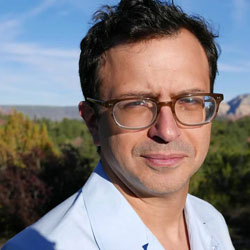The beaches are filled with cages
And the cages are filled with bodies
And the bodies are filled with burdens
And the burdens consume the bodies
And the bodies do not know to whom they owe their life
I drop my body on the sand and someone tells me to pick it up
I drop to the sand to pick up my body and someone tells me to steal more hair to steal more flesh to steal more bones to steal more fingers
I tell them I cannot risk contaminating the data
I tell them that if I steal more hair then the data will not be clean
I tell them I cannot touch my own body out of fear of contaminating the data
I have a virus I say
I am contagious I say
No salt in my body I say no heat in my blood
The sand is dying slowly
It turns into a wall and in the wall there is a nook and in the nook there is light and in light there is god and in god there is nothing and in nothing there is hope and in hope there is abandonment and in abandonment there is wound and in wound there is nation and in nation there are bones and in bones there is time and in time there is light and in light there are numbers and in numbers there are codes and in codes there are mountains and in mountains there are bodies searching for bones and in the mountains there are tunnels and in the tunnels there is so much festering garbage
The men in uniform take the garbage away but they have a hard time distinguishing the garbage from the people so they scoop it all up and carry us into the next morning
And in the next morning there is a confession
I have put my burdens in the wrong body
I have framed my burdens in the wrong language
I have staked my burdens to the wrong nation
I need medicine to sleep
I need medicine to stop the shrieking in my ears
I need medicine to make the Chicago corpses turn into hydrangeas
I need medicine to make the immigrants turn into butterflies
I need an injection to make the bureaucrats turn into terrorists
It is raining again on Lake Michigan
Some say it is raining bodies but really it is raining trash
The trash they bomb us with explodes when it lands near our bodies
And our bodies are tornadoes
And the joke turns into a mystery novel about how god keeps his hands from shaking when he is about to destroy the universe
I need my burdens sing the bodies on the beach
I fight for my burdens scream the bodies on the beach
I know the blankness of my burdens is a battle for love and country
I know the blankness of my burdens is a coda to the death of the city
I don’t know why I can’t see the moon anymore
I can’t see the stars for the sky anymore
I don’t even bother to look up
Notes on the Poem
Scene by scene, wielding hypnotic effects, Daniel Borzutzky presents powerful messages in his 2019 Griffin Poetry Prize shortlisted Lake Michigan. "Scene 18" is the closing sequence of this unforgettable collection. As we observed examining an earlier selection from Lake Michigan, a potent tool in Borzutzky's poetic arsenal is rigorously applied repetition. As the 2019 Griffin Poetry Prize judges expressed it:“Technically brilliant in its use of repetition and variation, leavened with touches of embittered, and yet, in the end, resilient, drollness, Lake Michigan is an eloquent, book-length howl, a piece of political theatre staged in a no-man’s land lying somewhere between the surreal and the real.”The incantatory lines of this and the poems/scenes leading up to "Scene 18" capture the power of chanting, to dissipate anger and outrage but, as Borzutzky has deployed it, to also build it to an undeniable crescendo. In describing Lake Michigan as "an eloquent, book-length howl", the 2019 judges allude to and connect the collection to the quintessential protest poem, Allen Ginsberg's "Howl". Described as "a denunciation of the weaknesses and failings of American society ... a combination lamentation, jeremiad, and vision", "Scene 18" is decidedly in the same spirit. A recent commentary piece in The New Yorker offers an intriguing examination of how methods of expressing rage have evolved, for good and for bad:"It’s not so much that anger itself has gone out of style but that the socially acceptable ways of channeling and expressing rage have radically changed."This is useful to bear in mind as we consider this poem and its companion pieces. Read it aloud yourself or have it read aloud to you. Ideally, have the poet read it, as he did this spring at the 2019 Griffin Poetry Prize shortlist readings ("Scene 18" starts at 57:30). You will discover that on the page and speaking the words, Borzutzky strikes a consistently compelling, at times troubling, frequently inspiring balance - protest at its most incisive.
